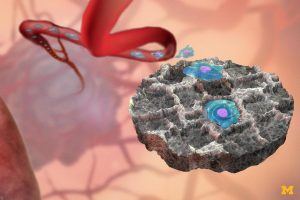Gobe Cherry in The Michigan Engineer:
 A small device implanted under the skin shows promise for improving breast cancer survival by catching cancer cells and slowing the development of metastatic tumors in other organs. These findings, based on experiments in mice and reported in the journal Cancer Research, suggest a path for identifying metastatic cancer early and intervening to improve outcomes. “This study shows that in the metastatic setting, early detection combined with a therapeutic intervention can improve outcomes. Early detection of a primary tumor is generally associated with improved outcomes. But that’s not necessarily been tested in metastatic cancer,” says study author Lonnie D. Shea, Ph.D., the William and Valerie Hall Department Chair of Biomedical Engineering at the University of Michigan.
A small device implanted under the skin shows promise for improving breast cancer survival by catching cancer cells and slowing the development of metastatic tumors in other organs. These findings, based on experiments in mice and reported in the journal Cancer Research, suggest a path for identifying metastatic cancer early and intervening to improve outcomes. “This study shows that in the metastatic setting, early detection combined with a therapeutic intervention can improve outcomes. Early detection of a primary tumor is generally associated with improved outcomes. But that’s not necessarily been tested in metastatic cancer,” says study author Lonnie D. Shea, Ph.D., the William and Valerie Hall Department Chair of Biomedical Engineering at the University of Michigan.
The study found 64 percent fewer metastatic cancer cells in the liver and 75 percent fewer metastatic cancer cells in the brains of mice implanted with the devices compared to mice without them, five days after both groups underwent surgery to remove cancerous tumors. This suggests that the presence of the device slows the progress of metastatic disease. The device is a scaffold is made of FDA-approved material commonly used in sutures and wound dressings. It’s biodegradable and could last up to two years within a patient. The researchers envision it would be implanted under the skin, monitored with non-invasive imaging and removed upon signs of cancer cell colonization, at which point additional treatment could be administered. The scaffold is designed to mimic the environment in other organs before cancer cells migrate there. The scaffold attracts the body’s immune cells, and the immune cells draw in the cancer cells. This then limits the immune cells from heading to the lung, liver or brain, where breast cancer commonly spreads.
More here.
